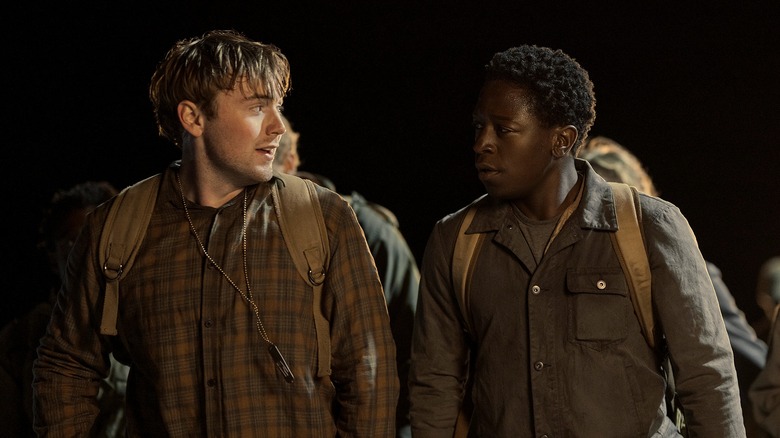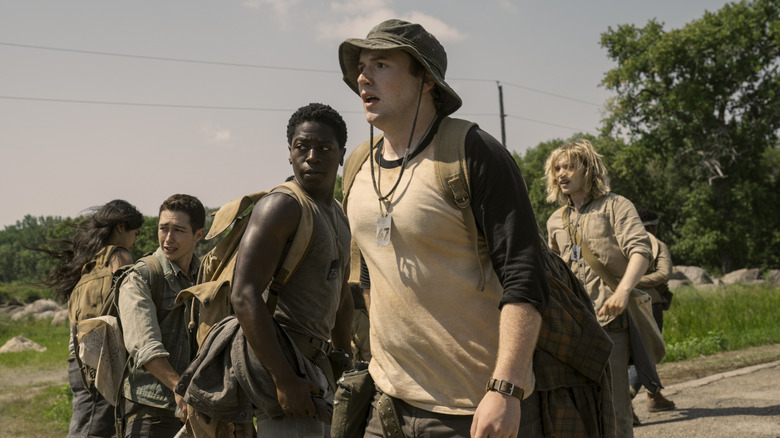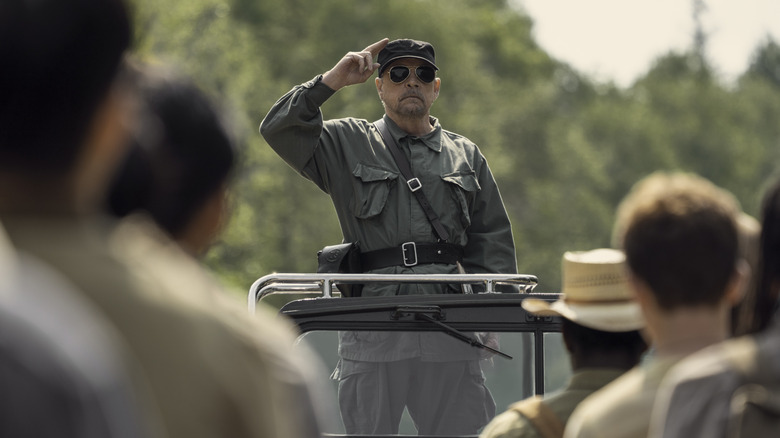The Long Walk Review: The Best Stephen King Adaptation In Years
- Recaptures the spirit of early Stephen King better than any recent adaptation
- A starkly realized dystopia on a minimalist level
- As tense as a movie about walking can be
- Slightly too hyper-masculine in places
- He’s not in it enough to ruin it, but Mark Hamill is a tad too over-the-top when the rest is so grounded
It might not be on the same level as the dreaded superhero fatigue, but based on the past few years of offerings, Stephen King fatigue on the big screen is a very real thing. I surely can't be alone in being underwhelmed by both Oz Perkins' take on his early short story "The Monkey," reimagined as a "Final Destination" style dark comedy without any of that series' depraved ingenuity; and Mike Flanagan's overly manipulative "The Life of Chuck," which bore a hacky end of first act twist I'm still rolling my eyes at months later. Getting Francis Lawrence, the man best known for "I Am Legend" and the "Hunger Games" sequels, to direct an adaptation of the closest thing King has written to a dystopian YA novel sounded like an even more tired prospect; a shameless attempt by Lionsgate to replicate the success of their biggest franchise in a moment of box office desperation.
Somehow, Lawrence and screenwriter J.T. Mollner's take on "The Long Walk" is a reminder of why King's stories have historically been well-suited for the screen, replicating the blend of melancholy, coming-of-age character study, and fatalistic horror that defined the very best adaptations of his work. And make no mistake, the inherent bleakness of its premise has not been watered down in its travel between mediums, offering zero silver linings or promises of redemption toward its young characters who are reluctantly taking part in an endurance contest only one of them will survive. Mollner wisely leaves most of the world-building in the peripheries, understanding that a dystopian future that has been salvaged by this deadly competition will make less sense the more time he dwells on it, instead focusing on the sheer desperation of an ensemble risking their lives for a cash prize that will help their families escape from economic ruin.
A minimalist dystopian tale
As Raymond Garraty (Cooper Hoffman) points out before the starting gun is fired, this is a competition every young man in America applies to take part in out of the hope of winning money, and the assumption they won't be the ones actually chosen to do it. After he quickly befriends Peter McVries (David Jonsson), we see the slowly increasing death toll from their perspective in the herd, with Francis Lawrence flying over an exposition dump from The Major (Mark Hamill) overseeing the contest to instead show us how the rules work in practice. Blood flows fast, with warnings and penalties issued for time stood still, or falling behind a certain pace; if you need to use the toilet, you likely won't survive, and if you've seriously injured yourself, you still need to carry on as there's no way to exit the competition without a bullet in the head. I admit that, going in, I assumed "The Long Walk" was a PG-13 movie in the same vein as the "Hunger Games" franchise, leaving violence to the imagination — a very early, graphic kill reset that expectation. With no variations to the competition formula throughout the runtime, Lawrence has his work cut out making a never-ending trek seem cinematic. It's to his credit that he rings so much tension out of initial conflicts — for example, will someone tie their shoes on time? — that a sense of dread is firmly implanted, which he manages to sustain even as the players dwindle down.
Unlike most dystopian tales, where expansive world-building is prioritized, "The Long Walk" goes for a stark minimalism. The competition takes place across hundreds of miles of rural America, with very few members of the public seen coming to observe an event we're told is a major annual tradition, conflicting with the mass spectatorship of the "Hunger Games" — the walk never feels like a mass media event, with the horrified faces of the few people we do see coming to gawp suggesting it has been roundly rejected by a public who are rightly sickened by it. You could probably argue that this suggests a far more hopeful dystopia than the typical one we see within this genre; the public doesn't have a mandate to watch, and their absence registers their disgust. This may be a factor caused by a lower budget than the typical blockbuster in this mold, but I thought Lawrence used that sheer desolation to his advantage to create something truly unsparing. The lack of spectators along the way re-emphasizes that few people are choosing to acknowledge the hopeless fates of these young men, and that their deaths are all in vain for a totalitarian system on its last gasp of air.
Stephen King done right
Another alarm bell that was ringing for me prior to seeing "The Long Walk" was the creative involvement of J.T. Mollner — I found his breakout hit, "Strange Darling," regressive in terms of narrative and style, its non-linear structure deployed only to hide its generic genre storytelling beats. Certainly, you could level that same criticism here too, with a hefty dose of casual homophobia from its characters, and the similarly retrograde trope of the most homophobic figure potentially being a closet case. To argue that though, you'd need to divorce the characters completely from their context; a far-right military dictatorship, an environment that has famously never fostered the best public perceptions of LGBTQ+ people, if it even makes them visible at all.
It's this backwards-looking environment that helps it attain the same tone as many of the earlier Stephen King adaptations. It doesn't have the nostalgia or sentimentality, but it recaptures the bittersweetness of "Stand By Me," a less fatal but equally heartfelt tale of a friendship group slowly realizing that they're growing apart, their current adventure likely to be their last. Before the bodies start piling up and the characters here have no choice but to walk, every conversation comes back to what they'll do after the walk, whether it's returning to their family or writing a memoir documenting the experience. These characters' fates are already sealed and these wishful hopes will never come true, and the screenplay does an adept job at managing to further flesh out characters purely through the discussions of futures that never will be.
Whether "The Long Walk" will combat King adaptation fatigue is to be seen, but it manages to recapture the intensity and melancholy of the earliest films inspired by his work in a way that few recently have.
"The Long Walk" premieres in theaters on September 12.


